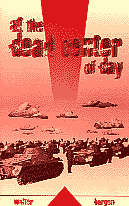BKMK Press–UMKC, 36 pages, 1997
$6.00
[reveal heading=”%image% Selection”]
THE ELVES AT KATYN FOREST
It started during the night after the burning of many cities.
It started when the soldiers in uniforms the color of miles
of muddy road began the forced march of the defeated.
The mud of the vanquished and the mud of the victors
indistinguishable. Prisoners became guards, guards prisoners.
Dressed in fear and exhaustion, no one any longer cared.
It started in a faraway country, years before, when money
was spent in wheelbarrows for a loaf of bread; when someone
in a place signed his name in water; when a cigarette butt
on a sidewalk was punishable death and conscription
It started in a shirt pocket crowded with rats, in a bowl full
of glass eyes blinking in all directions in a field hospital.
So the long muddled lines drudged into a dark forest
to a strange mumbled cadence-the belch of boots being sucked in
and out of mired miles-fifty thousand struggling vowels
and rifle reports the only consonants spoken over the dead
guarding the ditches. Soon the forest turned blacker than
its wet pines. Fore weeks, the raw upturned earth burst
into small blooms of brass buttons and bones. An entire country
stopped breathing. Each year the trees grew more bloated.
A half century later, out of Katyn Forest miles of mud-caked
uniform march. At dust-choked crossroads villagers look for
passing cars. The sucking sound, the faint moans, only wind twisting
through the gargoyled and steepled churches. Couples stroll along
rivers, watching their children run ahead. Cottonwoods sail
their leaves on the reddening current. The evening grows faint;
the sun’s pulse weak on the water. The children shiver, listening
to stories of elves who return to retake the country the lost.
[/reveal]
[reveal heading=”%image% Reviews”]
“…this chapbook has the finish of a careful, longtime practitioner. At the Dead Center of Day is a carefully built arrangement of poems , a journey through some of the genuine abominations of the twentieth century-the agonies we withdraw from unless pressed to the task by someone like Bargen, who reminds us that we dare not forget. Most of these poems are not just staged shockers, but responsible, vivid holdings of the imagery of horror. They contain genuine feeling and each is a subtle, cautionary deliverance.”
“Bargen concludes his chapbook with an extraordinary work, “The Elves of Katyn Forest,” which in essence delivers his final statement on the power of endurance in the face of contemporary horrors. The poem begins, “It started during the night after the burning of many cities. It started when the soldiers in uniforms the color of miles / of muddy road began the forced march of the defeated. / The mud of the vanquished and the mud of the victors / indistinguishable.” With frightening precision Bargen has “the long muddled lines drudged into a dark forest /to a strange mumbled cadence-the belch of boots being sucked in/and out of mired miles-fifty thousand struggling vowels/and rifle reports the only consonants spoken over the dead/guarding the ditches.” The entire country stops breathing. The trees become bloated. He concludes his poem:
A half century later, out of Katyn Forest miles of mud-caked
Uniforms march. At dust-choked crossroads villagers look for
Passing cars. The sucking sound, the faint moans, only wind twisting
Through the gargoyled and steepled churches. Couples stroll along
Rivers, watching their children run ahead. Cottonwoods sail
Their leaves on the reddening current. The evening grows faint;
The sun’s pulse weal on the water. The children shiver, listening
to stories of elves who return to retake the country they lost.
“Walter Bargen says more about the hate and cruelty of our time in a
few lines than does all the exhibitionist stomping and bellowing of a
dozen slam group.
-Paul Zimmer of The Georgia Review–
[/reveal]
